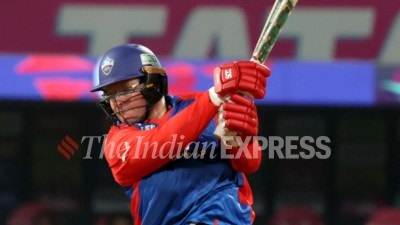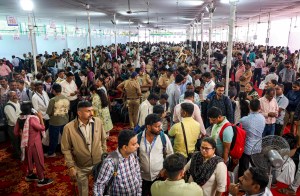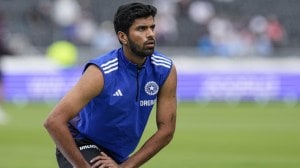Don146;t negotiate, adjudicate
In the week that the chief minister of Karnataka decided to take a long constitutional in preference to respecting the Constitution, the Ind...

In the week that the chief minister of Karnataka decided to take a long constitutional in preference to respecting the Constitution, the Indian Express editorial of October 9 voiced its slogan for a solution to the Cauvery imbroglio: 8216;negotiate, negotiate, negotiate8217;. It is difficult to imagine a less imaginative answer to the problem. The Express clearly does not know, or chooses not to remember, that negotiations have been going on over the Cauvery for the last 110 years 8212; since 1892, when negotiations commenced to accommodate Mysore8217;s grievances over the British-brokered Mysore-Madras agreement of that year. Those negotiations stretched over the next two decades till both sides agreed that it was not in negotiation but in arbitration that the answer lay. It was the arbitration award which led to the 1924 agreement which lasted till 1974.
Commencing from the eve of the expiry of that agreement, negotiations were held repeatedly for 17 fruitless years, from 1972 to 1989, but could arrive at no agreement. That is when the Supreme Court directed that the two states to end their negotiations and turn, as they had done 70 years earlier, to an arbitrator to give an award. Therefore, in March 1990, the Cauvery Tribunal was set up under the Inter-State River Waters Disputes Act of 1956, passed by Parliament precisely to deal with intractable disputes that cannot be resolved by negotiation. Would the Express please note that without the consent of Karnataka the tribunal could not have been established? Karnataka then, as now, under a Congress state government is, therefore, as much a party as Tamil Nadu and the Centre to the decision taken more than a decade ago 8212; at the instance of the Supreme Court 8212; to make arbitration, not negotiation, the path to a settlement.
The tribunal was headed by a most distinguished former justice of the Supreme Court and included two ex-high court judges of unimpeachable repute. The proceedings of the tribunal are quasi-judicial in nature. The tribunal found all the required data readily available on account of close on a century of negotiations. After studying the data, hearing the contending counsel, and touring the length of the basin from approximately where chief minister Krishna8217;s constituency lies in the upper basin to the delta where my constituency lies, the tribunal took only 15 months to give its quasi-judicial verdict 8212; the Interim Award of June 25, 1991.
Tamil Nadu 8212; as also Kerala and Pondicherry 8212; accepted the award with alacrity. Karnataka has mocked the Interim Award since it was given. Karnataka8217;s main grouse was that the award did not incorporate a 8216;distress-sharing8217; formula. The tribunal responded that in the event of distress, Karnataka might approach the Tribunal for a modification of the award for the period of the distress. This Karnataka refused to accept. Nor did it offer to enter into negotiations with the lower riparians on what might constitute a distress-sharing formula. Karnataka persisted instead with outright rejection of the award. Therefore, in 1995, Tamil Nadu took the matter to the Supreme Court praying for judicial confirmation of the quasi-judicial award and a direction to Karnataka to implement it. While the hearings were underway, following the elections of 1996, there was a change of government at the Centre and, to the astonishment of almost everyone, Deve Gowda, Karnataka8217;s most vicious hawk on the Cauvery, became PM.
In an extraordinarily cunning move, the Gowda government seized upon a single sentence in a clarificatory order of the tribunal to turn the award on its head. The award was in two parts. First, that as against an average annual flow of 550-600 tmc ft into the Mettur reservoir during the period of the previous 1924-74 agreement, Tamil Nadu8217;s annual entitlement would be slashed to a mere 205 tmc ft. If TN accepted the slashing, this was largely because justice was rendered to the delta in the second part of the award which stipulated a weekly schedule of flows which entitled Tamil Nadu to receive two-thirds of the annual flow, some 150 tmc ft, in the four-month period, June-September, when the summer kuruvai crop is raised and the nurseries for the winter samba crop are sown.
|
Instead of functioning as a forum to oversee implementation, the Cauvery River Water Authority is being misused as a forum for negotiation |
Opposing the weekly schedule, Karnataka requested the tribunal to allow unsent balances to expire at the end of each month instead of being carried forward. The tribunal reiterated its earlier position that balances must be carried forward to ensure that at least 205 tmc ft reaches Tamil Nadu over the year. The Deve Gowda government decided to interpret this clarification to mean that provided 205 tmc ft reached Tamil Nadu over the year, the weekly obligation under which 150 tmc ft would be supplied in the months it is desperately required 8212; June to September 8212; can be safely transgressed. Without disclosing this mendacious interpretation of the interim award to the Supreme Court, the central government in April 1997 suddenly informed the court that it had conceived a 8216;scheme8217; to 8216;implement the award8217;. And on the basis of this assurance, the Supreme Court agreed to 8216;suspend8217; 8212; but not close 8212; its hearings.
The central government8217;s 8216;scheme8217; for implementing the award turned out to be the Cauvery River Authority. Instead of functioning as a forum to oversee implementation, it is being misused as a forum for negotiation. Worse, it has not once been used to even raise the one element on which the interim award is silent: a 8216;distress-sharing8217; formula. Negotiations on water-sharing can only end in failure, as amply demonstrated over the last 110 years, because none of the riparians, in a democracy, can possibly persuade their people to accept what they must concede for negotiations to succeed. In the face of this undeniable political reality, the only answer 8212; short of dismantling our democracy 8212; is a judicial confirmation by the highest court in the land of the rights of the riparians as determined by the quasi-judicial tribunal. Hence, begging the Express8217; pardon, adjudication, not negotiation, is the solution to the imbroglio.
Email the author
- 01
- 02
- 03
- 04
- 05































